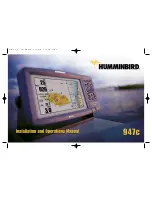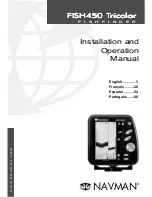
GPS AND CARTOGRAPHY
Your 900 Series™ uses GPS and sonar to determine your position, display it on a grid,
and provide detailed underwater information. The Global Positioning System (GPS) is
a satellite navigation system designed and maintained by the U.S. Department of
Defense. GPS was originally intended for military use; however, civilians may also take
advantage of its highly accurate position capabilities, typically /- 10 meters,
depending on conditions. This means that 95% of the time, the GPS receiver will read
a location within 10 meters of your actual position. The GPS Receiver also uses
information from WAAS (the Wide Area Augmentation System), EGNOS (the European
Geostationary Navigation Overlay Service), and MSAS (the MTSAT Satellite
Augmentation System) satellites if they are available in your area.
GPS uses a constellation of satellites that continually send radio signals to the earth.
Your present position is determined by receiving signals from up to 12 satellites and
measuring the distance from the satellites. The GPS Receiver, when attached to your
900 Series™, allows you to combine easy-to-use FishingGPS™ chartplotter and
navigation capabilities with advanced fishfinding. The following GPS functionality is
currently supported by the 900 Series™ when it is connected to a GPS Receiver:
• View current position
• View current track (breadcrumb trail)
• View precision speed and heading from your GPS receiver
• Save tracks, waypoints and routes
• Travel a route and navigate from one waypoint to the next.
NOTE
: 900 Series™ supports Navionics® Gold Charts marine cartography and Navionics®
HotMaps™ 2004 Gold for inland fishing. The 900 Series™ does not support Navionics®
Classic Charts.
Your 900 Series™ also comes with a built-in World map with a more detailed map of
North America (Domestic models) or a more detailed map of Europe and Southeast
Asia, including Australia and New Zealand (International models).
Your 900 Series™ uses the GPS Receiver to determine the position of the boat
automatically, and uses the zoom level settings on a particular view to select the best
chart to display. See
Viewing Cartography
for more information.
MULTI-MEDIA CARD (MMC)
AND SD SLOT
Your 900 Series™ supports cartography, and has two multi-
media card (MMC)/SD slots. Optional-purchase MMC
and/or SD cards can contain additional detailed maps. You
can also export navigation data from your unit onto an
MMC/SD card (see
Navigation Main Menu: Export All
Nav Data
). If you insert an MMC or SD card that contains a
more detailed chart for a particular location, your unit will
retrieve that chart and display it automatically.
Use the MMC/SD cards to update the software version of
your control head. To update the software in your control head, plug in the appropriate
MMC/SD card that contains a software update file; the unit will recognize it, will tell
you what software version your control head is currently running, and will ask you if
you want to update the software in the unit to match that on the MMC/SD card. You
can obtain software updates from the
www.humminbird.com
website.
Use the illustration to locate the position of the MMC and SD slot cover, remove the
cover, and then insert an MMC and/or an SD card into one or both slots - either slot can
accept either an MMC or an SD card.
The label on both types of cards should face
down and away from you so that you’re looking at the back of the card.
Press
down on the card until it clicks into place, then replace the slot cover and tighten the
screw snugly - do NOT overtighten, as this will not improve water resistance, and may
damage the cover.
Multi-Media Card (MMC)
and SD Slot
2
531374-1_A - 947 Man.qxd 2/15/2005 7:52 PM Page 7























